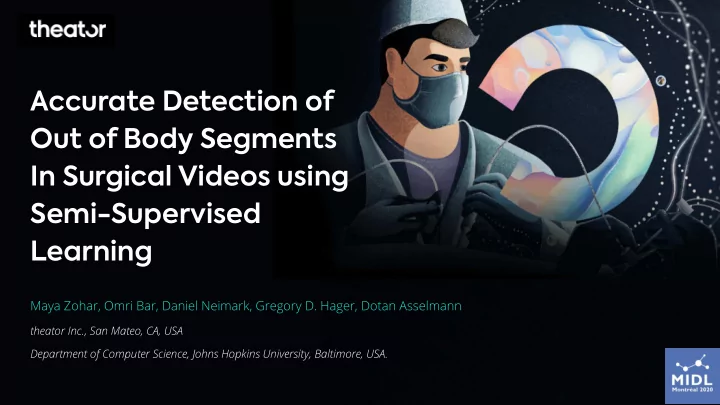

Accurate Detection of Out of Body Segments In Surgical Videos using Semi-Supervised Learning Maya Zohar, Omri Bar, Daniel Neimark, Gregory D. Hager, Dotan Asselmann theator Inc., San Mateo, CA, USA Department of Computer Science, Johns Hopkins University, Baltimore, USA.
Introduction Laparoscopic surgery and Surgical Intelligence
Motivation • Anonymization • Reduce storage size • Enhance model performance
Motivation Irrelevant frames and out of body segments Blurred Dark Out-of-body
Our goal Train a model capable of accurately detecting irrelevant segments throughout an entire surgical video
Quite simple task for a supervised classi fi cation… But what if the data is only partially labeled?
Method Annotate Train Iteration 0 Repeat
Method Annotate Train Iteration 1 Repeat
Method Annotate Train Iteration 2 Repeat
Dataset 640 videos Train Valid Test 600 20 20 From 6 di ff erent Videos Videos Videos medical centers Fully Fully Partially annotated annotated annotated
Results Out-of-body accuracy - 99.85%
Results Out-of-body - 98.8% In-body - 96.5% 97% Recall @ Out-of-body - 97.5% In-body - 96.2% 83.5% Precision
Results Theator, 2020 Twinanda et al., 2014 * 97% Recall @ 56.4% Recall @ 30.5% Precision 83.5% Precision * Andru Putra Twinanda, Michel De Mathelin, and Nicolas Padoy. Fisher kernel based task boundary retrieval in laparoscopic database with single video query. In International conference on medical image computing and computer-assisted intervention, pages 409– 416. Springer, 2014b.
Results Accurate Predictions
Results Examples of Misclassi fi cation
Conclusions Highly accurate classi fi cation of Limitations - handling edge out of body frames cases
Thank you! Gregory Hager Dotan Asselmann Omri Bar Maya Zohar Daniel Neimark maya@theator.io
Recommend
More recommend